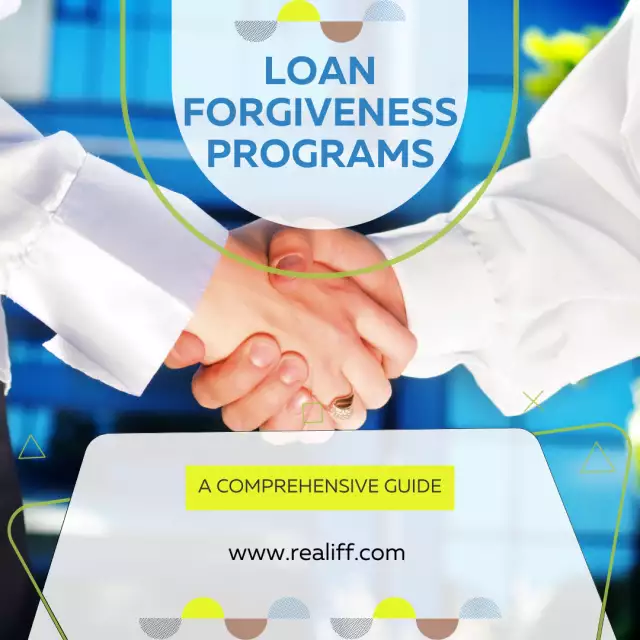A Comprehensive Guide to Loan Forgiveness Programs
Are you struggling to pay off your student loans? You're not alone. The average student loan debt for the class of 2021 was $38,837, and many borrowers struggle to make their payments. Fortunately, there are several loan forgiveness programs available that can help borrowers alleviate the burden of their student loans. In this comprehensive guide, we'll provide an overview of loanforgiveness programs, including options for public service employees, military service members, and borrowers experiencing financial hardship.
Overview of Loan Forgiveness Programs
Loan forgiveness is a program that cancels all or a portion of your student loan debt. Loan forgiveness programs are available to borrowers who meet certain eligibility requirements. There are several types of loan forgiveness programs, including public service loan forgiveness programs, military service loan forgiveness programs, and loan forgiveness programs for borrowers experiencing financial hardship.
Public Service Loan Forgiveness Programs
Public service loan forgiveness programsare designed to reward individuals who work in public service jobs by forgiving a portion of their student loan debt. To qualify for public service loan forgiveness, you must have made 120 qualifying payments while working full-time in a public service job. Examples of qualifying public service jobs include government employees, teachers, and non-profit workers. The process of applying for and being approved for public service loan forgiveness can be lengthy, so it's important to be prepared and stay on top of your application.
Military Service Loan Forgiveness Programs
Military service loan forgiveness programsare designed to reward individuals who have served in the military by forgiving a portion of their student loan debt. To qualify for military service loan forgiveness, you must have served in the military for a certain period of time, typically 10 years. Examples of qualifying military service include active duty, National Guard, and Reserve service. The process of applying for and being approved for military service loan forgiveness can also be lengthy, so it's important to be prepared and stay on top of your application.
Loan Forgiveness Programs for Borrowers Experiencing Financial Hardship
Loan forgiveness programs for borrowers experiencing financial hardship are designed to help individuals who are struggling to make their student loan payments due to financial hardship. To qualify for loan forgiveness due to financial hardship, you must meet certain eligibility requirements, such as having a low income or experiencing a disability that prevents you from working. Examples of hardship situations include unemployment, underemployment, and medical emergencies. The process of applying for and being approved for loan forgiveness due to financial hardship can be complex, so it's important to seek assistance from a qualified financial advisor.
Benefits and Drawbacks of Loan Forgiveness Programs
The main benefit of loan forgiveness programs is that they can help borrowers alleviate the burden of their student loan debt. However, there are also drawbacks to consider. For example, loan forgiveness programs may require a long-term commitment, such as working in a public service job or serving in the military for a certain period of time. Additionally, loan forgiveness programs may not be available to everyone, and not all types of student loans are eligible for loan forgiveness.
Comparison of Different Loan Forgiveness Programs
When deciding which loan forgiveness program is right for you, it's important to compare the different options available. Consider the eligibility requirements, benefits, and drawbacks of each program. It may also be helpful to seek advice from a financial advisor or student loan counselor to determine which program is the best fit for your unique financial situation.
Here are some frequently asked questions about loan forgiveness programs:
Who is eligible for loan forgiveness programs?
Eligibility requirements vary depending on the specific program. However, generally, public service loan forgiveness programs require individuals to work in public service jobs, military service loan forgiveness programs require individuals to have served in the military, and loan forgiveness programs for borrowers experiencing financial hardship require individuals to meet certain eligibility requirements such as having a low income or experiencing a disability that prevents them from working.
Can all types of student loans be forgiven through loan forgiveness programs?
No, not all types of student loans are eligible for loan forgiveness. Generally, only federal student loans are eligible for loan forgiveness programs. Private student loans are not eligible.
Do loan forgiveness programs require a long-term commitment?
Yes, many loan forgiveness programs require a long-term commitment, such as working in a public service job or serving in the military for a certain period of time.
What are the benefits of loan forgiveness programs?
The main benefit of loan forgiveness programs is that they can help borrowers alleviate the burden of their student loan debt. Depending on the program, borrowers may have all or a portion of their student loan debt forgiven.
What are the drawbacks of loan forgiveness programs?
One of the main drawbacks of loan forgiveness programs is that they may require a long-term commitment. Additionally, loan forgiveness programs may not be available to everyone, and not all types of student loans are eligible for loan forgiveness. It's important to carefully consider the benefits and drawbacks of loan forgiveness programs before making a decision.
In conclusion, loan forgiveness programs can be a great way for borrowers to alleviate the burden of their student loan debt. Whether you're a public service employee, a military service member, or someone experiencing financial hardship, there are loan forgiveness programs available to help you. By understanding the eligibility requirements, benefits, and drawbacks of each program, you can make an informed decision about which loan forgiveness program is right for you. Remember that loan forgiveness programs can be a long-term commitment and may not be the right fit for everyone, so it's important to carefully consider your options and seek advice if necessary. Ultimately, the goal of loan forgiveness programs is to help borrowers manage their student loan debt and achieve financial stability. By taking advantage of these programs, you can focus on building a bright financial future and achieving your goals.





